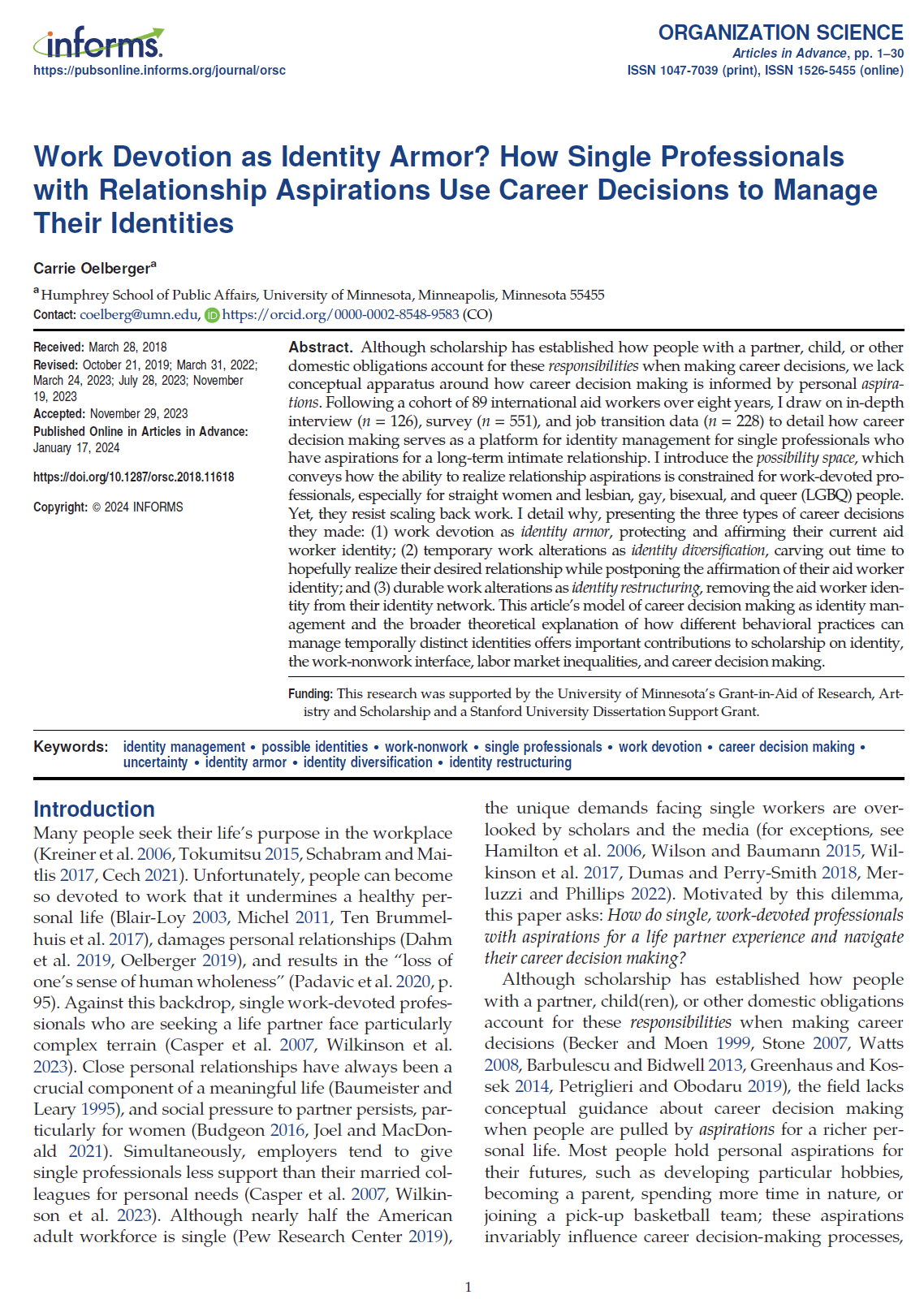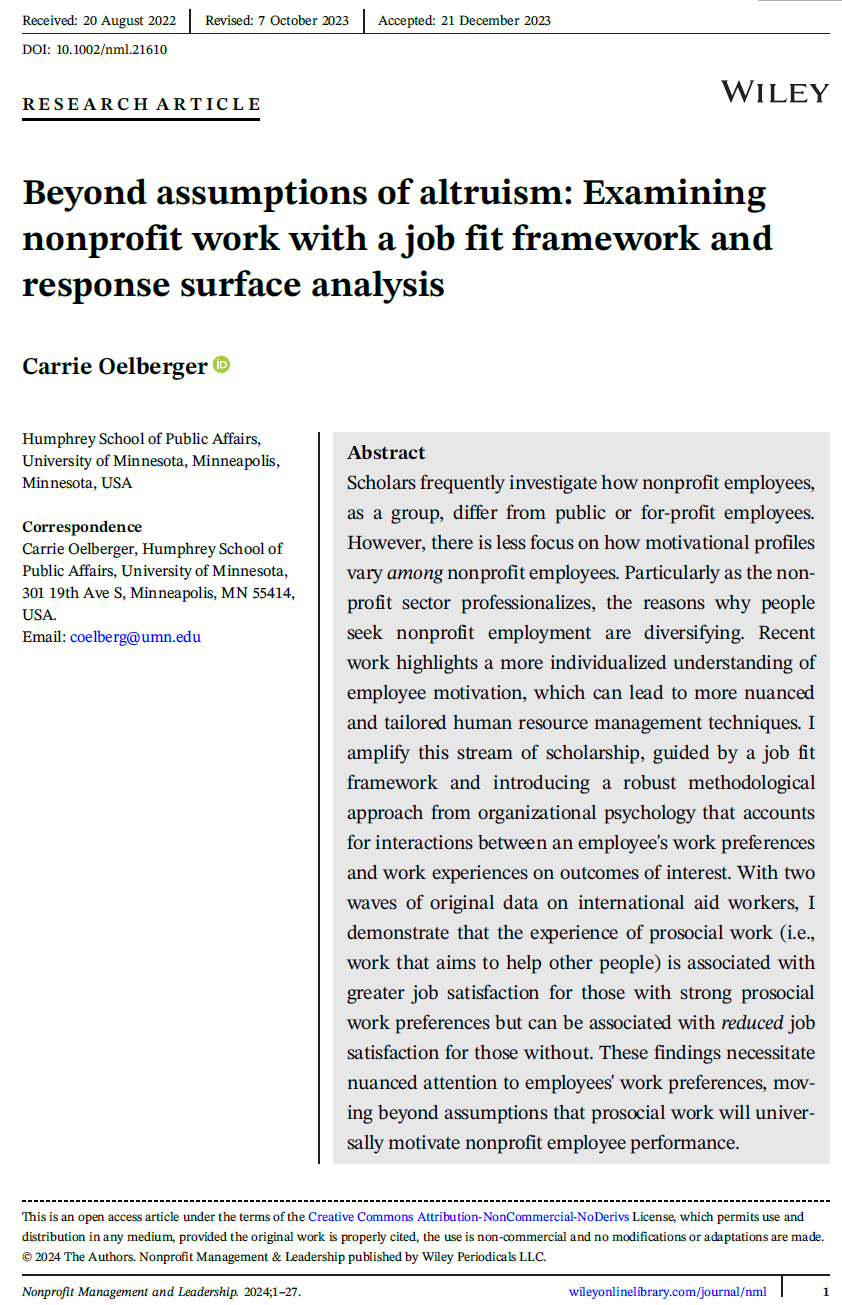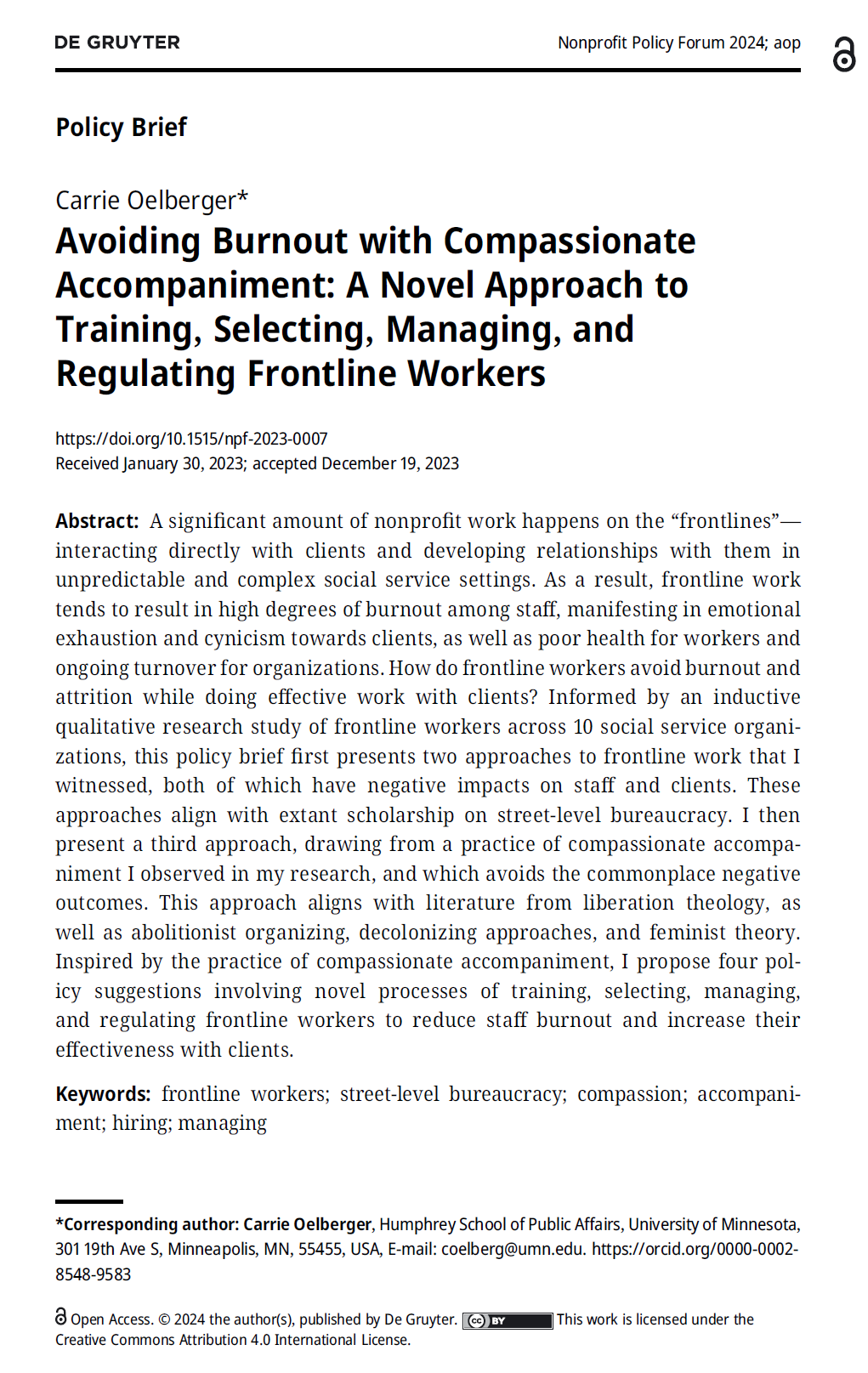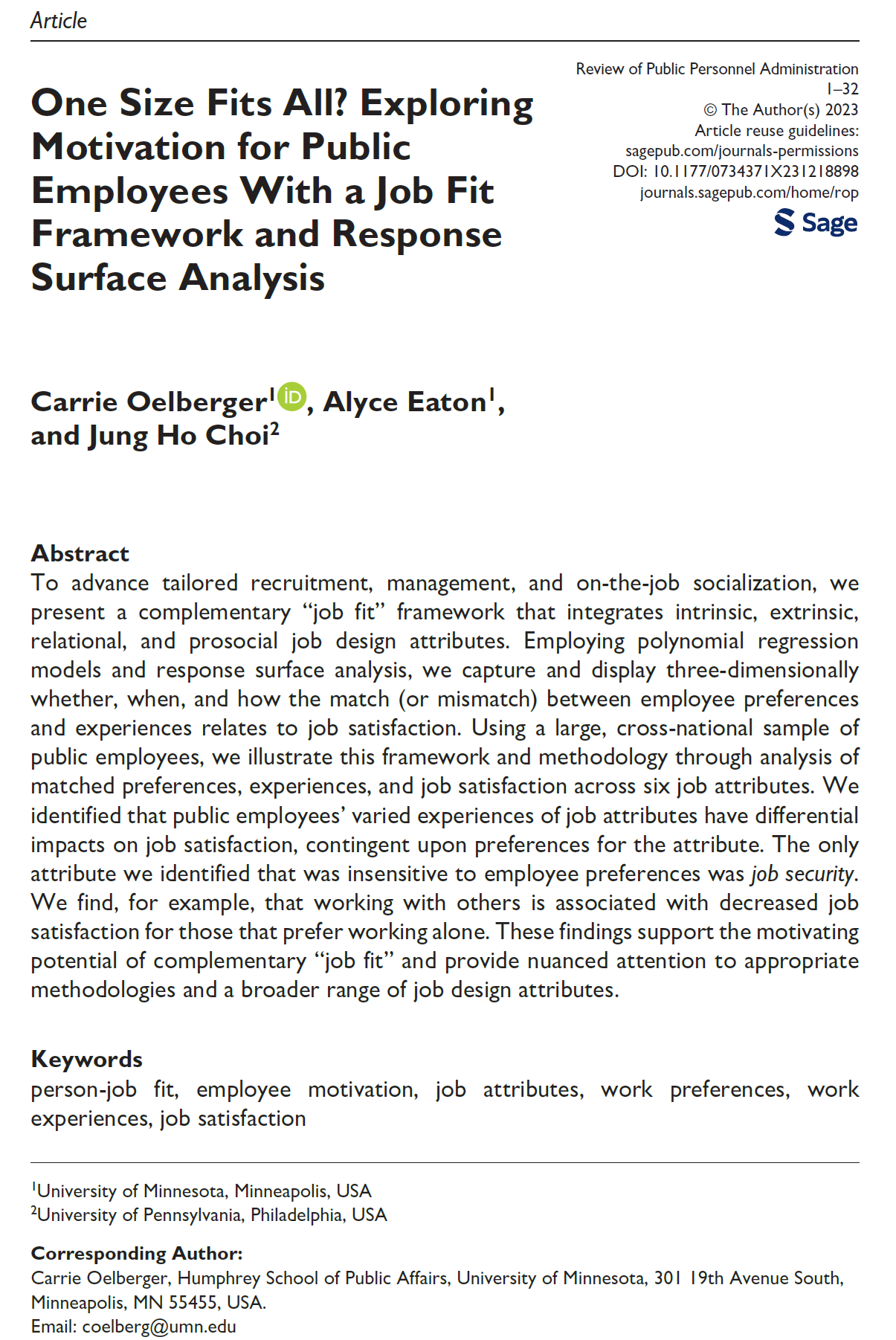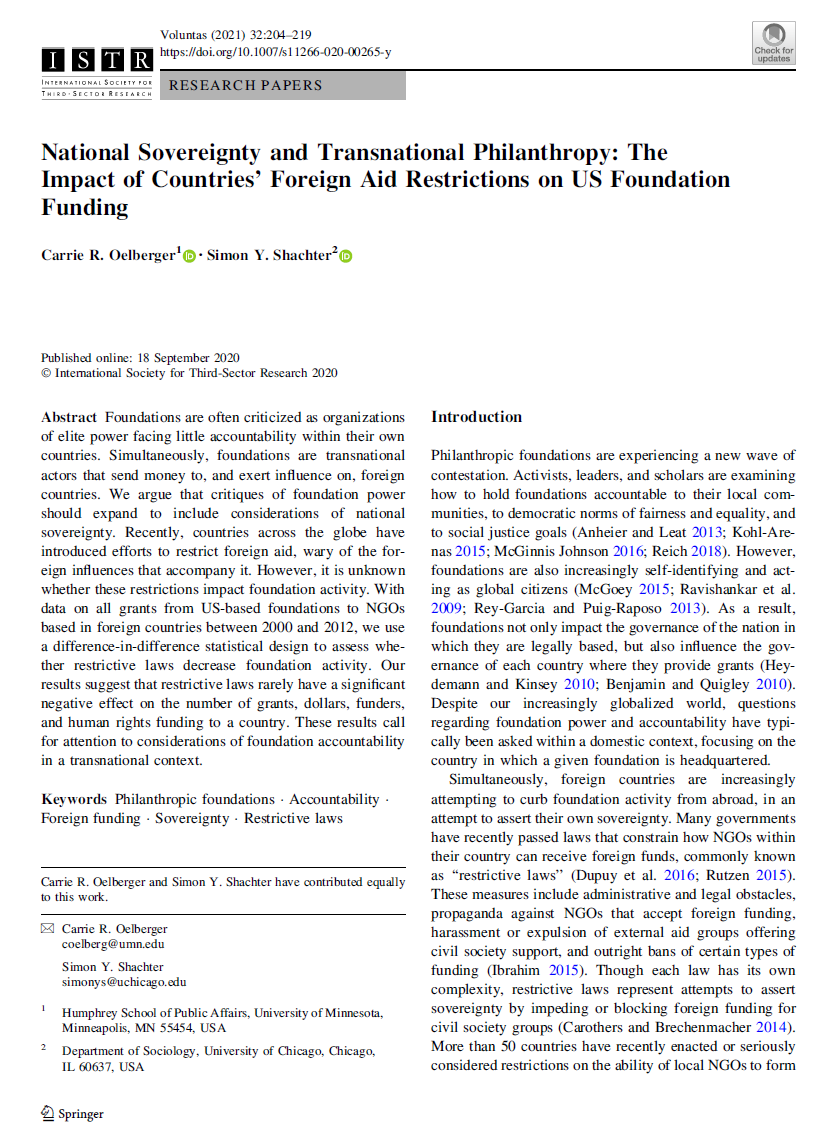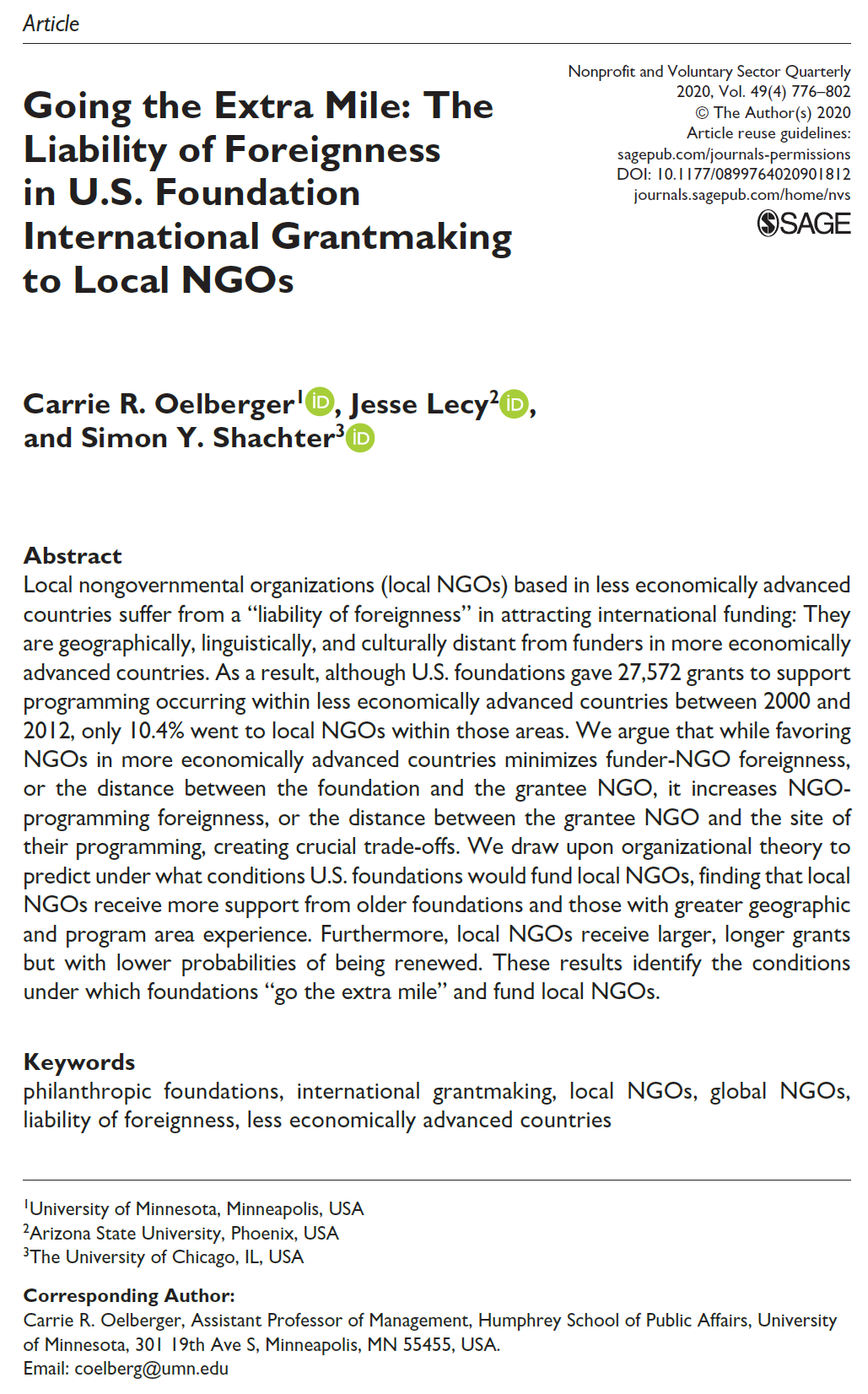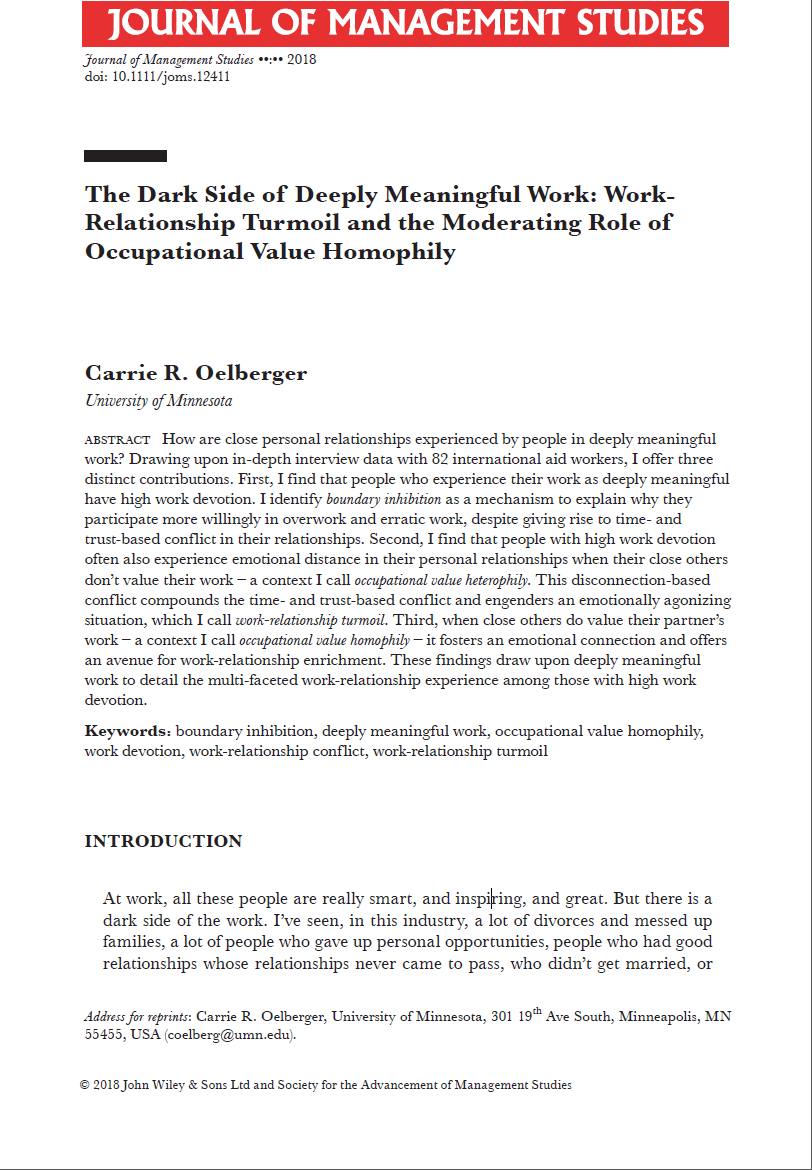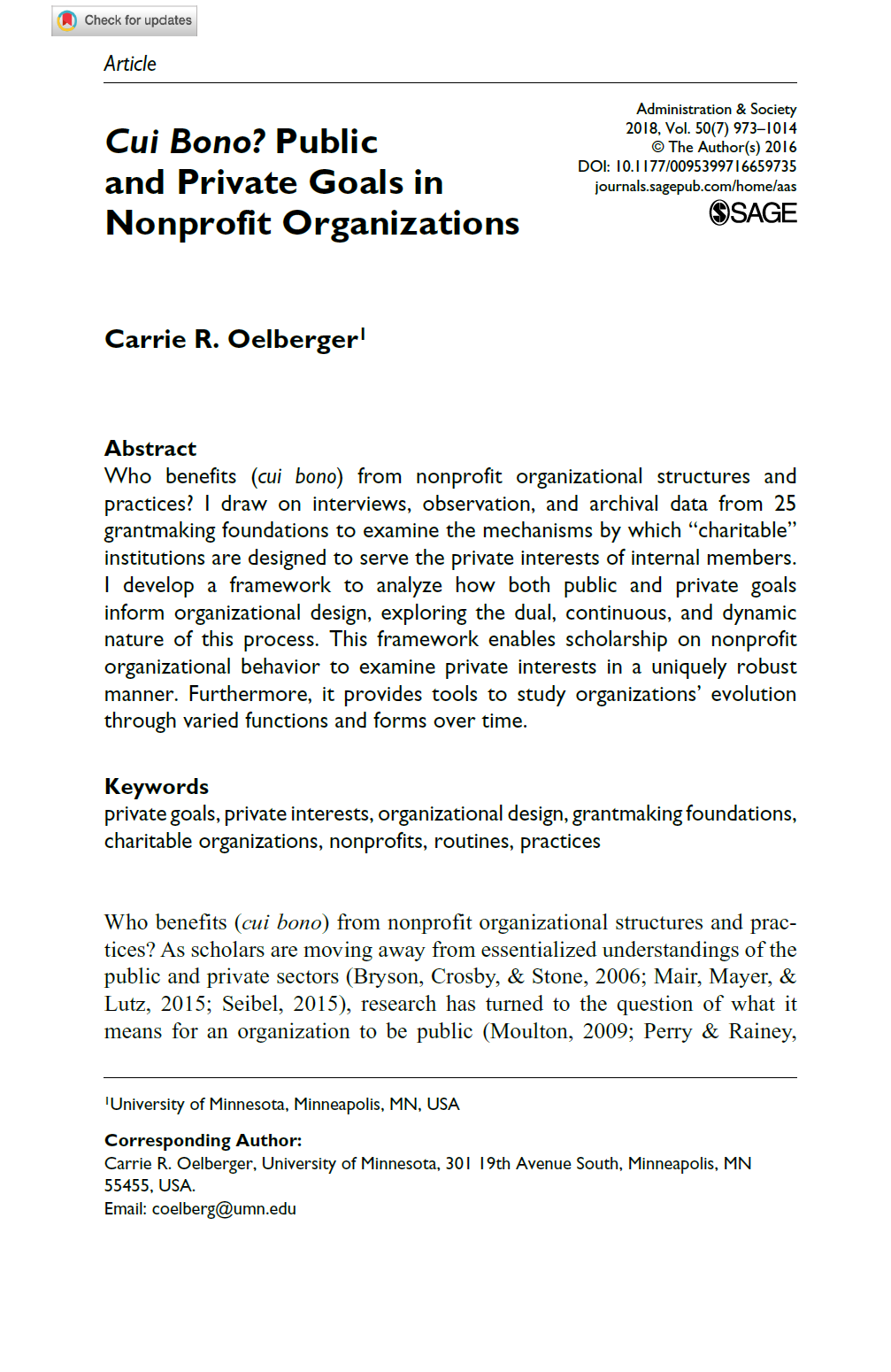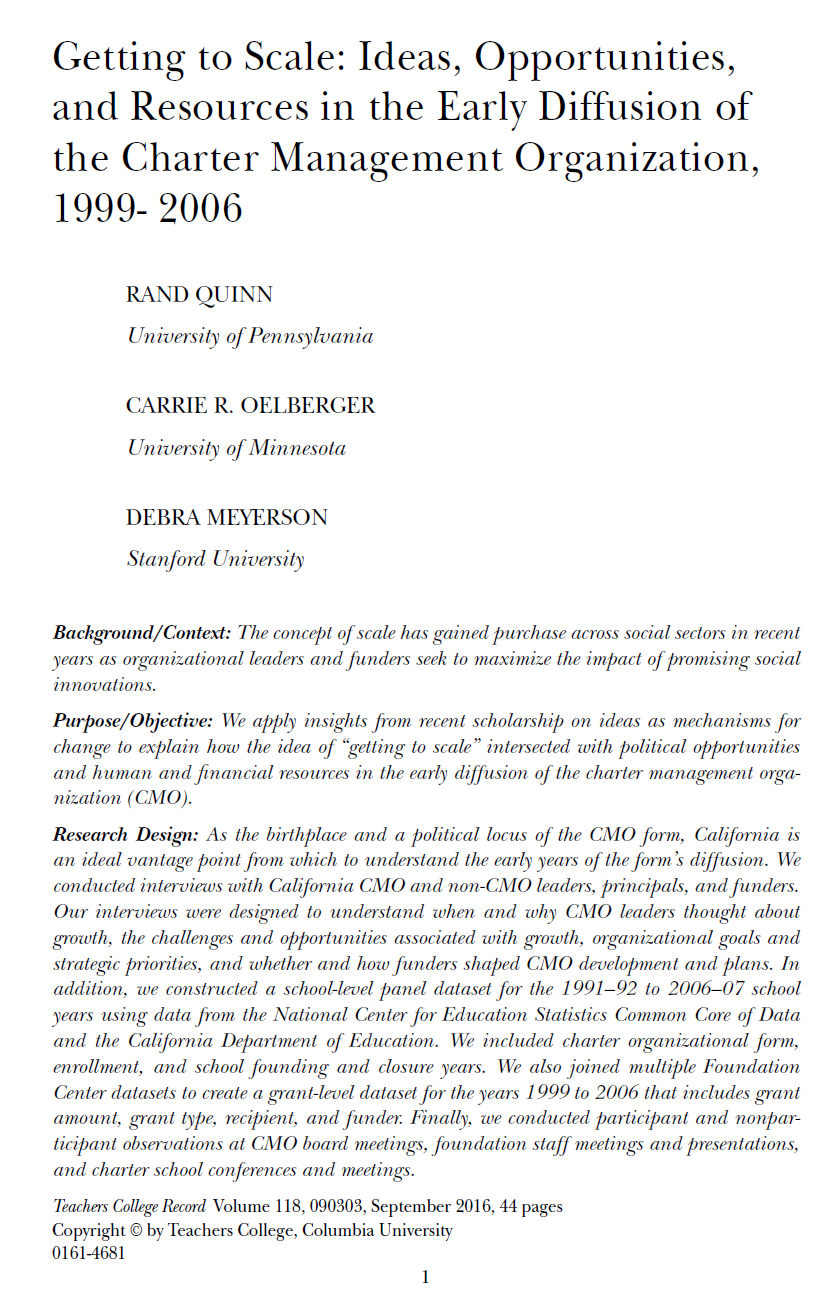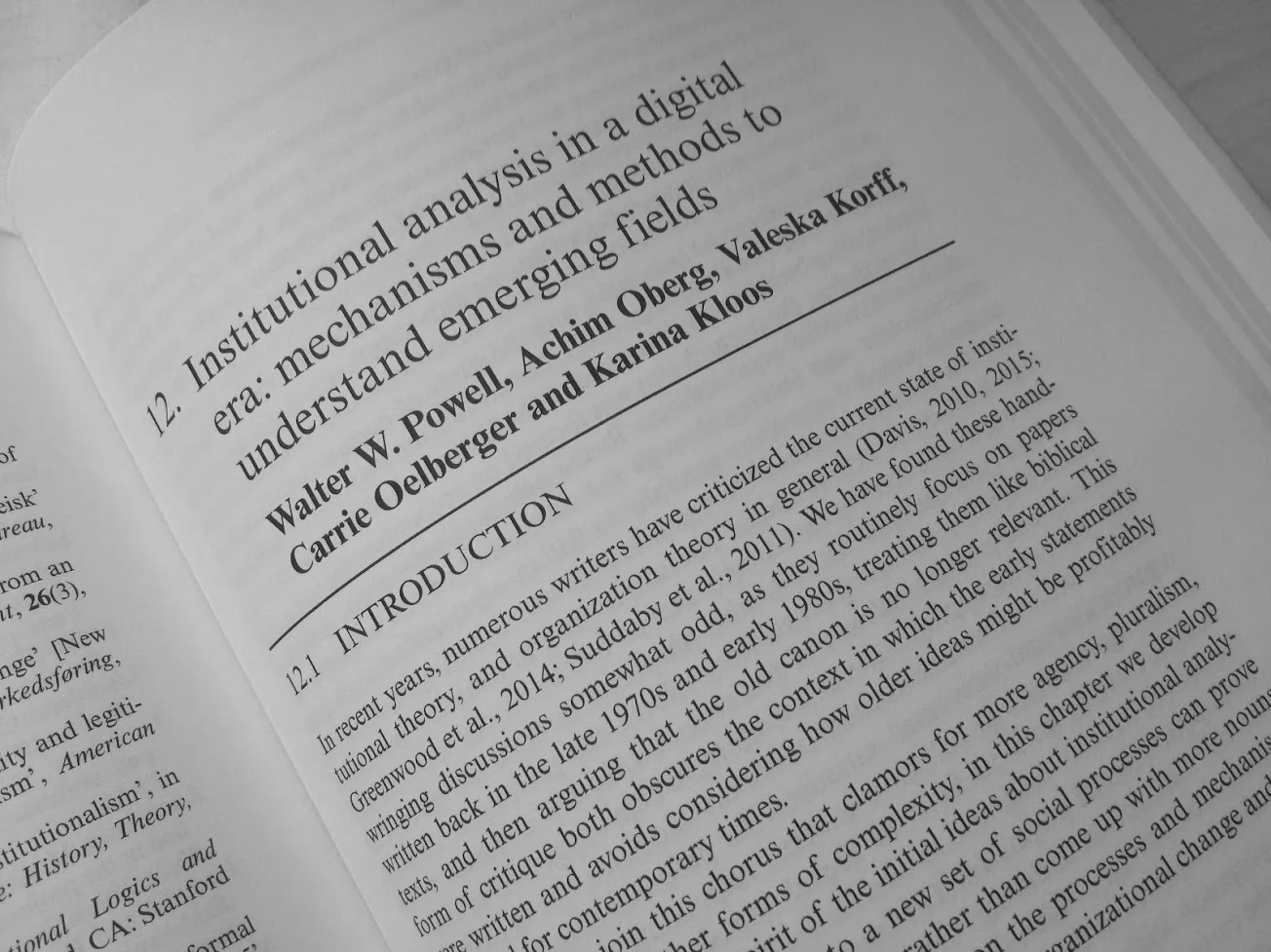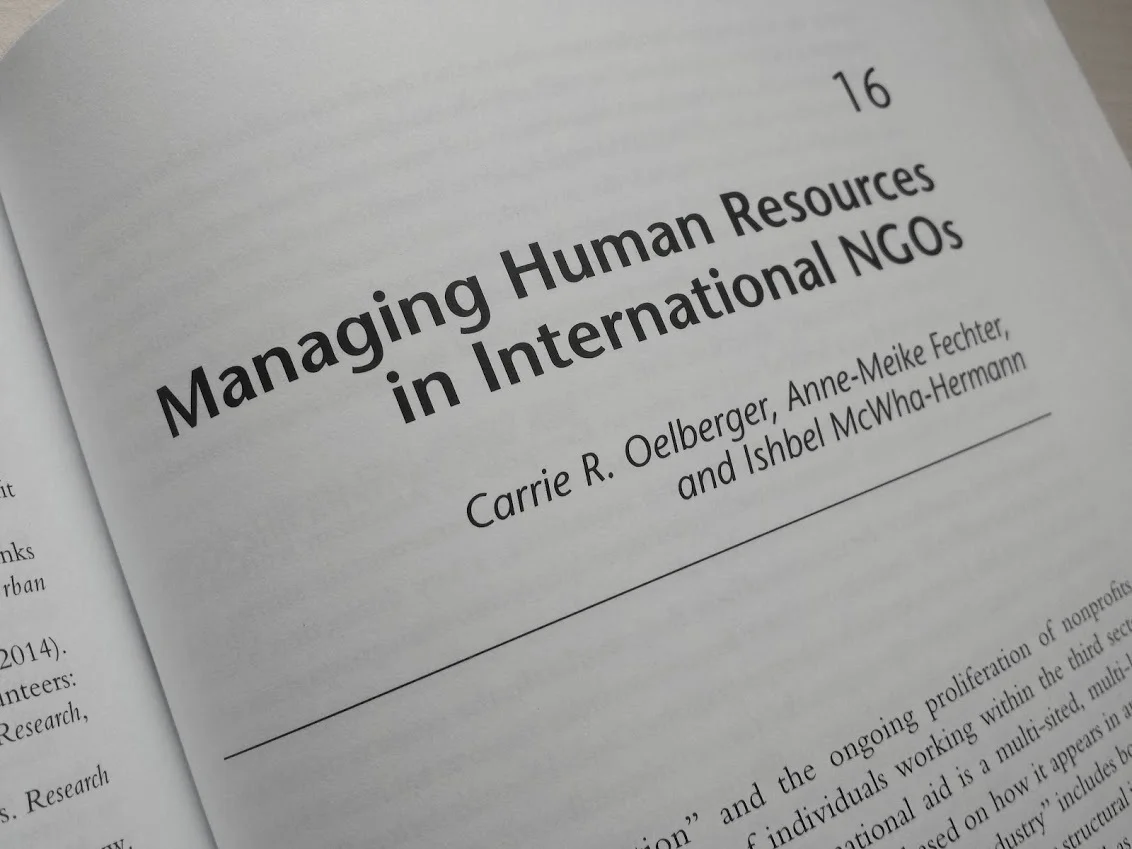Publications
Oelberger, Carrie R. (2024). Work Devotion as Identity Armor? How Single Professionals with Relationship Aspirations Use Career Decisions to Manage Their Identities. Organization Science.
** Best Paper Award from the European Group of Organizational Scholars (EGOS)
Abstract: Although scholarship has established how people with a partner, child, or other domestic obligations account for these responsibilities when making career decisions, we lack conceptual apparatus around how career decision making is informed by personal aspirations. Following a cohort of 89 international aid workers over eight years, I draw on in-depth interview (n = 126), survey (n = 551), and job transition data (n = 228) to detail how career decision making serves as a platform for identity management for single professionals who have aspirations for a long-term intimate relationship. I introduce the possibility space, which conveys how the ability to realize relationship aspirations is constrained for work-devoted professionals, especially for straight women and lesbian, gay, bisexual, and queer (LGBQ) people. Yet, they resist scaling back work. I detail why, presenting the three types of career decisions they made: (1) work devotion as identity armor, protecting and affirming their current aid worker identity; (2) temporary work alterations as identity diversification, carving out time to hopefully realize their desired relationship while postponing the affirmation of their aid worker identity; and (3) durable work alterations as identity restructuring, removing the aid worker identity from their identity network. This article’s model of career decision making as identity management and the broader theoretical explanation of how different behavioral practices can manage temporally distinct identities offers important contributions to scholarship on identity, the work-nonwork interface, labor market inequalities, and career decision making.
Oelberger, Carrie R. (2024). Beyond assumptions of altruism: Examining nonprofit work with a job fit framework and response surface analysis. Nonprofit Management and Leadership.
Abstract: Scholars frequently investigate how nonprofit employees, as a group, differ from public or for-profit employees. However, there is less focus on how motivational profiles vary among nonprofit employees. Particularly as the nonprofit sector professionalizes, the reasons why people seek nonprofit employment are diversifying. Recent work highlights a more individualized understanding of employee motivation, which can lead to more nuanced and tailored human resource management techniques. I amplify this stream of scholarship, guided by a job fit framework and introducing a robust methodological approach from organizational psychology that accounts for interactions between an employee's work preferences and work experiences on outcomes of interest. With two waves of original data on international aid workers, I demonstrate that the experience of prosocial work (i.e., work that aims to help other people) is associated with greater job satisfaction for those with strong prosocial work preferences but can be associated with reduced job satisfaction for those without. These findings necessitate nuanced attention to employees' work preferences, moving beyond assumptions that prosocial work will universally motivate nonprofit employee performance.
Oelberger, Carrie R. (2024). Avoiding Burnout with Compassionate Accompaniment: A Novel Approach to Training, Selecting, Managing, and Regulating Frontline Workers. Nonprofit Policy Forum.
Abstract: A significant amount of nonprofit work happens on the “frontlines”—interacting directly with clients and developing relationships with them in unpredictable and complex social service settings. As a result, frontline work tends to result in high degrees of burnout among staff, manifesting in emotional exhaustion and cynicism towards clients, as well as poor health for workers and ongoing turnover for organizations. How do frontline workers avoid burnout and attrition while doing effective work with clients? Informed by an inductive qualitative research study of frontline workers across 10 social service organizations, this policy brief first presents two approaches to frontline work that I witnessed, both of which have negative impacts on staff and clients. These approaches align with extant scholarship on street-level bureaucracy. I then present a third approach, drawing from a practice of compassionate accompaniment I observed in my research, and which avoids the commonplace negative outcomes. This approach aligns with literature from liberation theology, as well as abolitionist organizing, decolonizing approaches, and feminist theory. Inspired by the practice of compassionate accompaniment, I propose four policy suggestions involving novel processes of training, selecting, managing, and regulating frontline workers to reduce staff burnout and increase their effectiveness with clients.
Oelberger, Carrie R., Alyce Eaton, and Jung Ho Choi (2025). One Size Fits All? Exploring Motivation for Public Employees With a Job Fit Framework and Response Surface Analysis. Review of Public Personnel Administration.
Abstract: To advance tailored recruitment, management, and on-the-job socialization, we present a complementary “job fit” framework that integrates intrinsic, extrinsic, relational, and prosocial job design attributes. Employing polynomial regression models and response surface analysis, we capture and display three-dimensionally whether, when, and how the match (or mismatch) between employee preferences and experiences relates to job satisfaction. Using a large, cross-national sample of public employees, we illustrate this framework and methodology through analysis of matched preferences, experiences, and job satisfaction across six job attributes. We identified that public employees’ varied experiences of job attributes have differential impacts on job satisfaction, contingent upon preferences for the attribute. The only attribute we identified that was insensitive to employee preferences was job security. We find, for example, that working with others is associated with decreased job satisfaction for those that prefer working alone. These findings support the motivating potential of complementary “job fit” and provide nuanced attention to appropriate methodologies and a broader range of job design attributes.
Oelberger, Carrie R. and Simon Shachter. (2021). National Sovereignty and Transnational Philanthropy: The Impact of Countries’ Foreign Aid Restrictions on US Foundation Funding. VOLUNTAS: International Journal of Voluntary and Nonprofit Organizations.
Abstract: Foundations are often criticized as organizations of elite power facing little accountability within their own countries. Simultaneously, foundations are transnational actors that send money to, and exert influence on, foreign countries. We argue that critiques of foundation power should expand to include considerations of national sovereignty. Recently, countries across the globe have introduced efforts to restrict foreign aid, wary of the foreign influences that accompany it. However, it is unknown whether these restrictions impact foundation activity. With data on all grants from US-based foundations to NGOs based in foreign countries between 2000 and 2012, we use a difference-in-difference statistical design to assess whether restrictive laws decrease foundation activity. Our results suggest that restrictive laws rarely have a significant negative effect on the number of grants, dollars, funders, and human rights funding to a country. These results call for attention to considerations of foundation accountability in a transnational context.
Oelberger, Carrie R., Jesse Lecy, and Simon Shachter. (2020). Going the Extra Mile: The Liability of Foreignness in U.S. Foundation International Grantmaking to Local NGOs. Nonprofit and Voluntary Sector Quarterly. 49(4) 776-802.
Abstract: Local NGOs based in less economically advanced countries suffer from a “liability of foreignness” in attracting international funding: they are geographically, linguistically, and culturally distant from funders in more economically advanced countries. As a result, although U.S. foundations gave 27,572 grants to support programming occurring within less economically advanced countries between 2000 and 2012, only 10.4% went to local NGOs within those areas. We argue that while favoring NGOs in more economically advanced countries minimizes foundation-NGO foreignness, or the distance between the foundation and the grantee NGO, it increases NGO-programming foreignness, or the distance between the grantee NGO and the site of their programming, creating crucial trade-offs. We draw upon organizational theory to predict under what conditions U.S. foundations would fund local NGOs, finding that local NGOs receive more support from older foundations and those with greater geographic and program area experience. Furthermore, local NGOs receive larger, longer grants but with lower probabilities of being renewed. These results identify the conditions under which foundations “go the extra mile” and fund local NGOs.
Oelberger, Carrie R. (2019). The Dark Side of Deeply Meaningful Work: Work-Relationship Turmoil and the Moderating Role of Occupational Value Homophily. Journal of Management Studies. 56(3) 558-588.
Abstract: How are close personal relationships experienced by people in deeply meaningful work? Drawing upon in-depth interview data with 82 international aid workers, I offer three distinct contributions. First, I find that people who experience their work as deeply meaningful have high work devotion. I identify boundary inhibition as a mechanism to explain why they participate more willingly in overwork and erratic work, despite giving rise to time- and trust-based conflict in their relationships. In addition, people with high work devotion often experience emotional distance in their personal relationships if their close others don’t value their work—a context I call occupational value heterophily—which compounds the time- and trust-based conflict and engenders an emotionally agonizing situation, which I call work-relationship turmoil. Third, when close others do value their partner’s work—a context I call occupational value homophily—it fosters an emotional connection and offers an avenue for work-relationship enrichment. These findings draw upon deeply meaningful work to detail the multi-faceted work-relationship experience among those with high work devotion.
Oelberger, Carrie R. (2018). Cui Bono? Public and Private Goals in Nonprofit Organizations. Administration & Society. 50(7) 973-1014.
Abstract: Who benefits (cui bono) from nonprofit organizational structures and practices? I draw on interviews, observation, and archival data from 25 grantmaking foundations to examine the mechanisms by which “charitable” institutions are designed to serve the private interests of internal members. I develop a framework to analyze how both public and private goals inform organizational design, exploring the dual, continuous, and dynamic nature of this process. This framework facilitates examinations of private interests in a uniquely robust manner. Furthermore, it provides tools to study organizations’ evolution through varied functions and forms over time.
Quinn, Rand, Carrie R. Oelberger, and Debra E. Meyerson. (2016). Getting to Scale: Ideas, Resources, and the Diffusion of the Charter Management Organization. Teachers College Record. 118 (9)
Abstract: The concept of scale has gained purchase across social sectors in recent years as organizational leaders and funders seek to maximize the impact of promising social innovations. We apply insights from recent scholarship on ideas as mechanisms for change to explain how the idea of “getting to scale” intersected with political opportunities and human and financial resources in the early diffusion of the charter management organization (CMO). Understood and framed as the vehicle for getting to scale, the CMO form drew a disproportionate share of private philanthropy dollars, appealed to a new class of professionals from outside of education, and was successfully distinguished from alternative charter forms, all of which contributed to its early diffusion. We develop a fuller understanding of the charter school movement, describing how the diffusion of the CMO form displaced ideas about school-level autonomy and decentralization in favor of ideas about getting to scale and tipping the system. The study also offers insight to scholars analyzing current and past efforts at educational reform by emphasizing the roles played by ideas, opportunities, and resources.
Powell, Walter W., Achim Oberg, Valeska Korff, Carrie R. Oelberger, and Karina Kloos. (2017). “Institutional Analysis in a Digital Era: Mechanisms and Methods to Understand Emerging Fields.” In New Themes in Institutional Analysis: Topics and Issues from European Research, C. Mazzo, R. Meyer, G. Krücken, and P. Walgenbach (editors), Cheltenham: Edward Elgar
Oelberger, Carrie R., Anne-Meike Fechter, and Ishbel McWha-Hermann (2017). “Managing Human Resources in International NGOs.” In The Nonprofit Human Resource Management Handbook: From Theory to Practice, J. Sowa and J. Word (editors), CRC Press/Taylor and Francis

